 Petzlover
Petzlover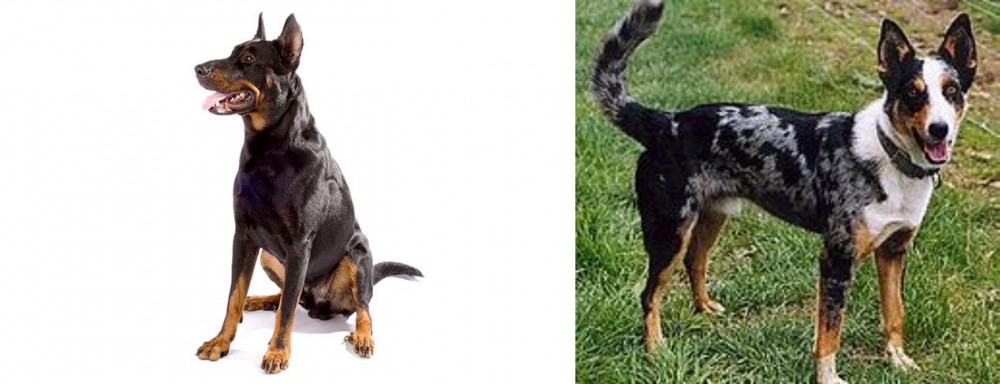 Beauceron is originated from France but German Coolie is originated from Australia. Beauceron may grow 11 cm / 5 inches higher than German Coolie. Beauceron may weigh 26 kg / 58 pounds more than German Coolie. Beauceron may live 4 years less than German Coolie. Both Beauceron and German Coolie has almost same litter size. Both Beauceron and German Coolie requires Low Maintenance.
Beauceron is originated from France but German Coolie is originated from Australia. Beauceron may grow 11 cm / 5 inches higher than German Coolie. Beauceron may weigh 26 kg / 58 pounds more than German Coolie. Beauceron may live 4 years less than German Coolie. Both Beauceron and German Coolie has almost same litter size. Both Beauceron and German Coolie requires Low Maintenance.
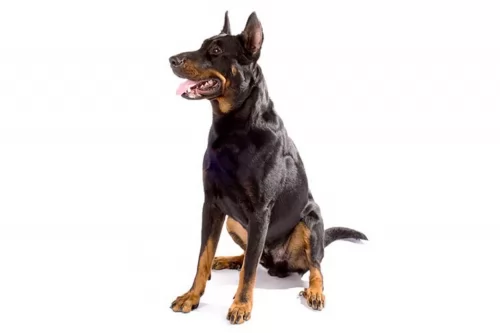 Sometimes referred to as the king of sheepdogs, the Beauceron is a French dog breed that happens to be an extraordinary herding dog too. He instinctively rounds up livestock without even being trained to do so. The dog is also known as Berger de Beauce, originating from the Beauce region in France and is closely related to the Briard or Berger de Brie.
Sometimes referred to as the king of sheepdogs, the Beauceron is a French dog breed that happens to be an extraordinary herding dog too. He instinctively rounds up livestock without even being trained to do so. The dog is also known as Berger de Beauce, originating from the Beauce region in France and is closely related to the Briard or Berger de Brie.
This French breed’s origin goes back to the late 16th century, and the Beauceron was divided into two working types way back in 1863 - the dog with the long coat was known as Berger de Brie or Briard while the short-coated dog became known as Beauceron. It was in 1922 that a club for this dog breed was established, and the Beauceron Club of America was established in 1980, only recently receiving recognition by the American Kennel Club.
 The German Coolie is misnamed as it is an Australian bred dog and often called the Australian Koolie or Coolie. This Australian breed is more often just called a Coolie. The breed is a typical herding breed and a working dog that needs a job all the time. They have been a favorite of Australians since the late 1800’s when local dogs were bred with British working dogs.
The German Coolie is misnamed as it is an Australian bred dog and often called the Australian Koolie or Coolie. This Australian breed is more often just called a Coolie. The breed is a typical herding breed and a working dog that needs a job all the time. They have been a favorite of Australians since the late 1800’s when local dogs were bred with British working dogs.
Although all Coolie’s are not the same. Within the breed there is a lot of variation. This is because the Coolie was bred individually for different regions in Australia. In a very different writing the Koolie Club of Australia does not define the Coolie breed on confirmation as all other purebred dogs are defined. Instead the Coolie is defined by ability to work. In light of this most Coolie breeders state that the Coolie is a breed and the variations you see among regions are types within the breed.
As a herding dog, the Coolie brought a lot of skill to the Australian farmers and sheep herders. The Coolie will round up the sheep and bring them back to their enclosure at the shepherd’s command. They are upright, silent, working dogs. Not only do they herd sheep they are important at sheering to “cut out” the sheep or assist in the close quarters of lambing.
In Queensland North and New South Wales, the Coolie is medium boned, tall and agile ready to herd cattle over a long stretch of miles. In the Snowy Mountains of New South Wales and the Hunter Valley Region, the Coolie is shorter and thicker in order to be able to get cattle that are lying low out from the gullies and dense bush. The Coolies found in Victoria are the smallest of all.
No matter where they live and work, the Coolie is bred to help the workers there, the farmers, the stockman, and the grazier. All Coolies are adaptable and very agile. They all have a strong willfulness to accomplish what they are asked to do. The ancestors of these various Coolie was the British Collie – a smooth coated, blue merle. This Collie was crossed with the Black and Tan Collie from the Scottish Highlands. It is believed that these are the same Collie breeds that came to Australia to create the Heeler.
The name may come from the German immigrants working in South Australia and unable to pronounce Collie incorrectly they called the dogs German Coolies. There is also a fraction of German breeders who believe that the German Tiger dog was brought to Australia in the 18th century and then when the Collies came they were bred together. Many Coolie breeders have records showing that the breed has been in Australia for at least 160 years. It is also believed that the Border Collie and Kelpie (Blue Heeler) were mixed into the breed at sometime as well.
No bench standard exists for the German Coolie even though there is the Koolie Club of Australia. The mission of the club is to protect, preserve and promote the breed. The Australian Sporting Register was recognizing the Coolies in 2004. They are eligible to participate in the Australian National Kennel Council sanctioned sporting trials. They participate in Queensland, New South Wales and Victoria through the individual states sporting register. Here they participate in herding, jumping, obedience, agility and tracking.
Several other recognitions as a herding breed soon followed. The Australian Shepherd Club of America, the American Herding Breed Association, were followed by recognition from others as well. They are not recognized by the American Kennel Club (AKC).
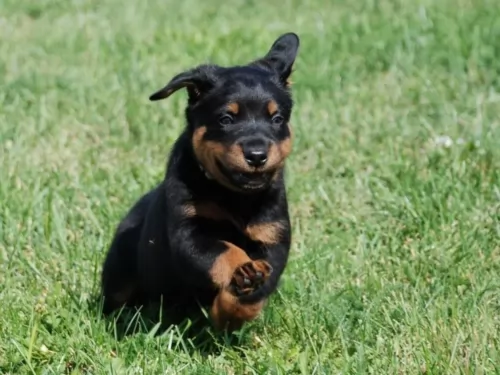 The Beauceron is an intelligent dog, just by looking at the alert, bright face. He is a muscular, large dog breed, standing up to 71cm in height and weighing in at up to 50kg. You’ll recognize him with his dark black coat with red markings, particularly around the feet, which interestingly gives this breed the French nickname Bas Rouge. It means red stockings. Harlequin, tri-coloured grey, black and tan is also recognized as a color.
The Beauceron is an intelligent dog, just by looking at the alert, bright face. He is a muscular, large dog breed, standing up to 71cm in height and weighing in at up to 50kg. You’ll recognize him with his dark black coat with red markings, particularly around the feet, which interestingly gives this breed the French nickname Bas Rouge. It means red stockings. Harlequin, tri-coloured grey, black and tan is also recognized as a color.
The coat is rough, short and dense, the alert eyes dark brown and the ears are set high and can be cropped or natural. The natural ears are half pricked or drop ears and are fairly short. Looking similar to the Doberman and Rottweiler but with a long tail, this French Shepherd dog is somewhat slimmer but with a foreboding appearance. He is solid, well proportioned and well muscled and gives the impression of strength. He has a tolerant nature and will fit in well with a family when trained and socialized.
 With their strong ancestry among the family of collies and herders, the German Coolie shares the look of collies and shepherds. Even though they differ from region to region and there is no actual standard, they are medium sized dogs with blue or brown eyes or even one of each. The ears are folded over on top when relaxed but they are rigid and straight when he is more alert. The nose is either chocolate or red depending on the color of their coat.
With their strong ancestry among the family of collies and herders, the German Coolie shares the look of collies and shepherds. Even though they differ from region to region and there is no actual standard, they are medium sized dogs with blue or brown eyes or even one of each. The ears are folded over on top when relaxed but they are rigid and straight when he is more alert. The nose is either chocolate or red depending on the color of their coat.
They can have either a long, medium or short coat but most owners want the short coat that is smooth as well. The coat can be one color – red/chocolate or black; Bi – red/white or black/white; Tri – solid black or red with white and brown; Tri merle -merle with white and brown; Merle – red merles and blue merles. Regardless of color, the German Coolie has the look of a collie or German Shepherd.
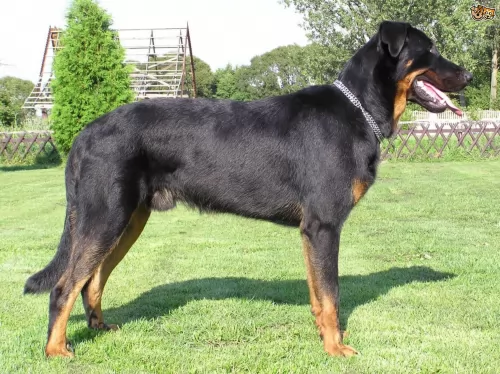 Strong, big, confident and good-looking the Beauceron makes an excellent watchdog, guarding the human family that he is so devoted too. He is a good friend and companion and is tolerant with children and other pets.
Strong, big, confident and good-looking the Beauceron makes an excellent watchdog, guarding the human family that he is so devoted too. He is a good friend and companion and is tolerant with children and other pets.
He is such a clever breed too, and its small wonder that he has always been sought after for hard work – herding, shepherding and even rescue work. When he’s not involved in working, at home, he’s just your big, devoted friend.
 Yes, they can be very friendly with children is they are socialized and supervised.
Yes, they can be very friendly with children is they are socialized and supervised.
They have enough stamina to work for 14 hours a day.
They are very adaptable. They can be calm and steady when working a mother and baby lamb and then be able to forcefully move steers, bull, rams or weathers.
The breed is highly intelligent, and their learning ability is excellent because they want to please you.
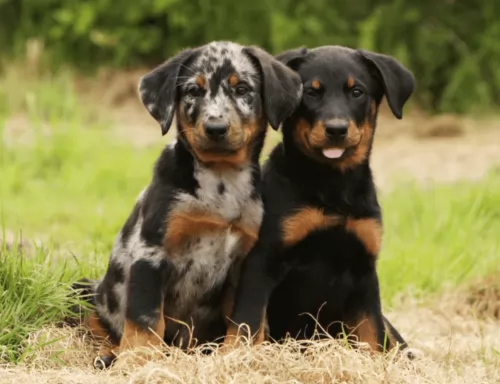 It’s such a nice strong, good-looking dog this, you can’t think of anything going wrong with him. His lifespan is anything from 10 to 14 years and the dog is pretty robust. Being a large breed and a pedigree, he is prone to some common ailments. When you suspect your beloved pet has any health issue, don’t hesitate to get him to the vet.
It’s such a nice strong, good-looking dog this, you can’t think of anything going wrong with him. His lifespan is anything from 10 to 14 years and the dog is pretty robust. Being a large breed and a pedigree, he is prone to some common ailments. When you suspect your beloved pet has any health issue, don’t hesitate to get him to the vet.
A painful disorder that affects larger dogs and brought about by an abnormal development in the joints.
Also a painful condition where the stomach twists so that the blood supply is cut off. Large breeds with deep chests are more prone to developing the condition. Rapid breathing and signs of pain can be indicative of this ailment.
 This is a relatively healthy breed without many genetic disorders found in purebreds due to the 160 years they have spent fairly isolated and allowing natural selection to take its course.
This is a relatively healthy breed without many genetic disorders found in purebreds due to the 160 years they have spent fairly isolated and allowing natural selection to take its course.
In Merle dogs there can be deafness and/or blindness. If you breed a solid to a merle you can eliminate that.
These are not inherited but rather acquired due to the immense amount of jumping and running.
Rare but it does occur and can be fatal if not treated
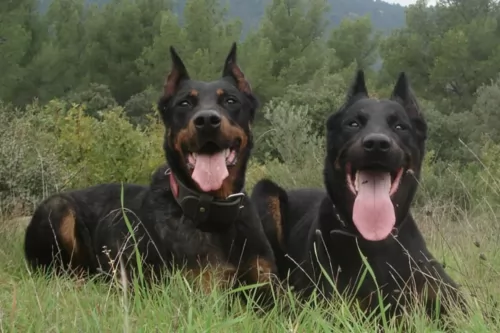 This is a large, hard-working, energetic dog and he will need high-quality food, whether commercially manufactured or home-prepared. The best commercially manufactured dog foods produce foods with the right balance of minerals and vitamins in keeping with your dog’s age, his activities and his stage of life (illness, senior, puppy). If you’re unsure about what to feed your Beauceron, speak to your vet to be 100% that you are meeting his nutritional demands, and always ensure a bowl of cool, clean water is constantly available.
This is a large, hard-working, energetic dog and he will need high-quality food, whether commercially manufactured or home-prepared. The best commercially manufactured dog foods produce foods with the right balance of minerals and vitamins in keeping with your dog’s age, his activities and his stage of life (illness, senior, puppy). If you’re unsure about what to feed your Beauceron, speak to your vet to be 100% that you are meeting his nutritional demands, and always ensure a bowl of cool, clean water is constantly available.
You’re lucky with the Beauceron as he is a low shedding, low maintenance dog with his short coat. He doesn’t require any trimming but will need a good brush twice a week to rid him of loose hairs. Clean his teeth with a special dog toothbrush and toothpaste to avoid plaque buildup. Never use human toothpaste. Clip his nails if he doesn’t wear them down naturally.
This is a big, strong, energetic dog, and you owe it to him to ensure he gets lots of exercise – runs, walks and ball games. If you can’t be a responsible dog owner, don’t own a breed like this as he can become destructive if not kept active.
 Break meals into 3 a day feeding a high quality dry puppy food designed for dogs of his size. 11/2 to 2 cups per day.
Break meals into 3 a day feeding a high quality dry puppy food designed for dogs of his size. 11/2 to 2 cups per day.
Break meals into 2 a day feeding a high quality dry adult food designed for dogs of his size.
Traditionally good health. Great energy, intensity and devotion to work and owner.
This is an energetic dog that loves to work and needs to work. Regular routine exercise is needed daily. He needs to be stimulated mentally and physically. Find him a job. Make sure he knows what you want him to do. They work well with a human partner in games such as agility, tracking, flyball and herding. They need a large yard and a lot of play time. They are not couch potatoes and would be unhappy if they were stuck in a house or apartment